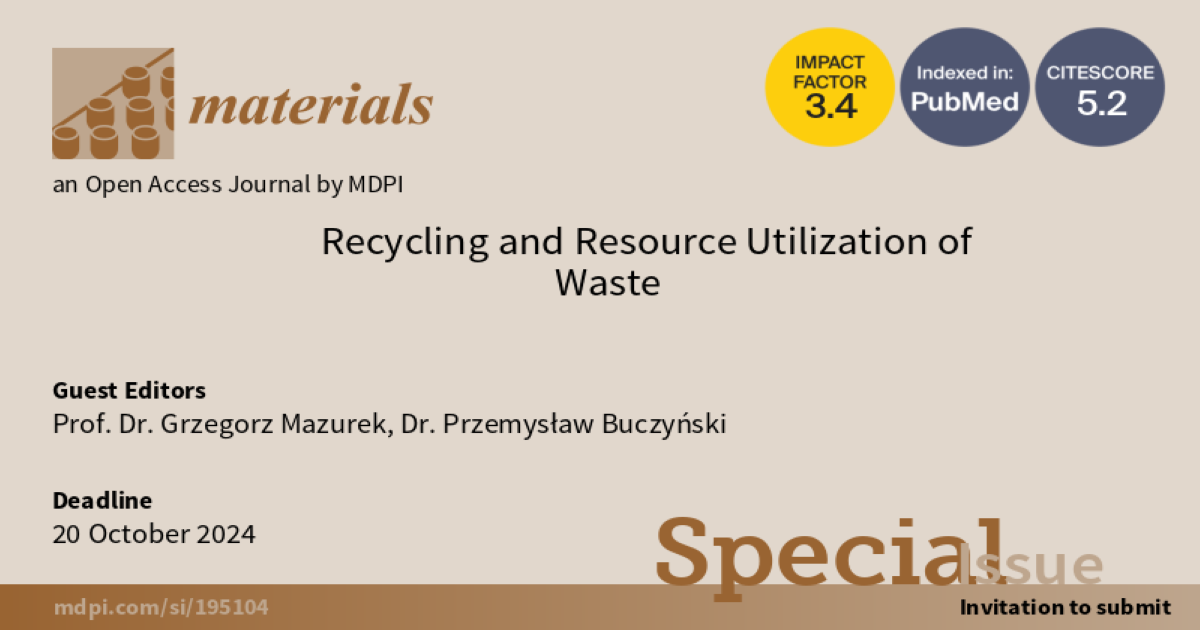Recycling and Resource Utilization of Waste
A special issue of Materials (ISSN 1996-1944). This special issue belongs to the section "Green Materials".
Deadline for manuscript submissions: 20 October 2024 | Viewed by 880

Special Issue Editors
Interests: pavement engineering; FEM modeling; bitumen and bituminous composite rheology; data mining; design of experiment theory; recycled aggregate; recycling and utilization of polymer plastics
Special Issues, Collections and Topics in MDPI journals
Interests: cold recycled material mixtures; pavement engineering; cold recycling; reclaimed asphalt pavement; foamed bitumen; bitumen emulsion; road binder; bitumen and bituminous composites
Special Issue Information
Dear Colleagues,
Volumes of stockpiled waste containing all kinds of polymers have prompted the design of new material solutions in civil engineering. The climate change we are witnessing is a product of human industrial activity, which, in addition to pushing the greenhouse effect to dangerous levels, generates massive amounts of waste. However, with the increasing spotlight on sustainability, incredible advances in science and technology have led to the transformation of a significant portion of waste materials into components for composites in civil engineering. Since sustainable road construction requires the optimal use of natural resources, there is a great need to expand our knowledge and practices regarding the reuse (recycling) of waste materials as modifiers and additives.
We are delighted to invite you to submit original research articles that will stimulate further work on the development of modern composite materials containing recycled materials or by-product waste in civil engineering.
Prof. Dr. Grzegorz Mazurek
Dr. Przemysław Buczyński
Guest Editors
Manuscript Submission Information
Manuscripts should be submitted online at www.mdpi.com by registering and logging in to this website. Once you are registered, click here to go to the submission form. Manuscripts can be submitted until the deadline. All submissions that pass pre-check are peer-reviewed. Accepted papers will be published continuously in the journal (as soon as accepted) and will be listed together on the special issue website. Research articles, review articles as well as short communications are invited. For planned papers, a title and short abstract (about 100 words) can be sent to the Editorial Office for announcement on this website.
Submitted manuscripts should not have been published previously, nor be under consideration for publication elsewhere (except conference proceedings papers). All manuscripts are thoroughly refereed through a single-blind peer-review process. A guide for authors and other relevant information for submission of manuscripts is available on the Instructions for Authors page. Materials is an international peer-reviewed open access semimonthly journal published by MDPI.
Please visit the Instructions for Authors page before submitting a manuscript. The Article Processing Charge (APC) for publication in this open access journal is 2600 CHF (Swiss Francs). Submitted papers should be well formatted and use good English. Authors may use MDPI's English editing service prior to publication or during author revisions.
Keywords
- recycled materials as matrices for composites
- novel applications of waste-based construction materials
- rheological modeling of waste-polymer-modified bitumen and asphalt pavement
- modification of binders and asphalt pavements with waste polymers
- advanced statistical methods for predicting recycled materials’ properties
- methods for waste polymer utilization
Benefits of Publishing in a Special Issue
- Ease of navigation: Grouping papers by topic helps scholars navigate broad scope journals more efficiently.
- Greater discoverability: Special Issues support the reach and impact of scientific research. Articles in Special Issues are more discoverable and cited more frequently.
- Expansion of research network: Special Issues facilitate connections among authors, fostering scientific collaborations.
- External promotion: Articles in Special Issues are often promoted through the journal's social media, increasing their visibility.
- e-Book format: Special Issues with more than 10 articles can be published as dedicated e-books, ensuring wide and rapid dissemination.
Further information on MDPI's Special Issue polices can be found here.







